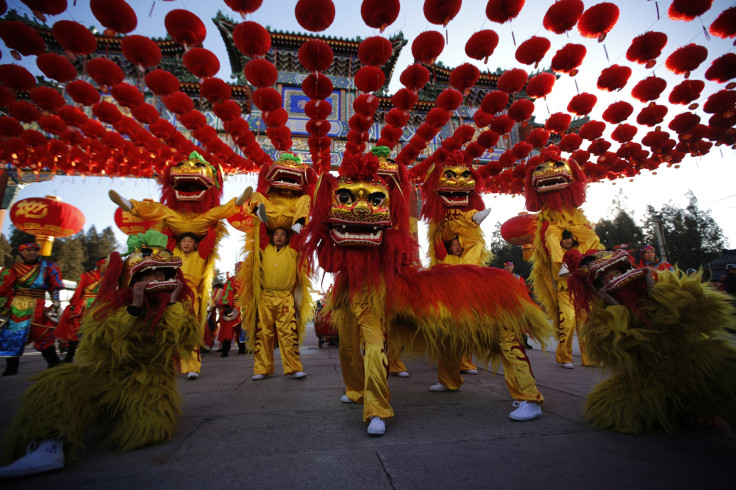Chinese New Year Traditions: Celebrations Take On Digital Form

Observing Chinese New Year, arguably China’s most important holiday that begins Feb. 19, involves the practice of various traditions. While many rituals, like setting off fireworks, eating symbolic foods like noodles, oranges and dumplings, and traveling to see loved ones endure, others are evolving to keep pace with new technology.
For example, taxi-hailing app Uber is now helping some of its users get into the holiday spirit by offering a service that allows users to order lion dancers to their door. “Each city is partnering with [a] local dance troupe to offer some festive joy, as well as be delivering Uber swag!” a blog post on Uber's website says.
Lion dancers are a traditional part of the Lunar New Year celebration or any other special occasion in China, and supposedly scare away bad energy and spirits.
“Our app connects people with the closest possible driver. So we try to think, what else can we connect you with the closest possible of anything?” Sam Gellman, Uber’s Hong Kong-based general manager said, according to the Wall Street Journal. “For Chinese New Year, we thought this would be a fun thing that celebrates the local culture and shows off the technology well.”
According to Uber’s website, the service will be offered in eight mainland Chinese cities, in addition to Hong Kong and Singapore. The service, which is subject to availability of a dance troupe, costs 188 yuan ($30), and can be paid for with the regular Uber app.
Another long-standing tradition of the 15-day Chinese holiday is heading to local places of worship to offer incense and pray for a prosperous year. Temples across the country see extra foot traffic in the days leading up to the holiday, as well as during the holiday, with thousands of worshippers queueing up for hours to make offerings.
This year, the Journal reports that several temples have decided to capitalize on the busy period and tradition by auctioning off the first incense to be lit in the New Year. The Huilong temple in Jinhua, Zhejiang, sold on an e-commerce website the privilege of being the first in the temple to light incense and strike the temple bell in the new year, to the highest bidder for 21,501 yuan.
The digitization of Chinese New Year traditions has been going on for some time now. Giving children and other young people red envelopes filled with cash is an activity synonymous with the holiday. And, last year, text-messaging service WeChat launched a new feature on their app that allowed users to send their contacts digital versions of the iconic “hongbao” red envelopes. While friends swapped e-hongbaos on their phones, actual money would be exchanged through the application’s payment service.
“This is an Internet era,” Fa Pin, a man working at Pure Yang Palace, a temple in Datong, Shanxi, one of the handful of temples that participated in an online auction, told the Journal. “As times change, we need to change too.”
© Copyright IBTimes 2024. All rights reserved.





















